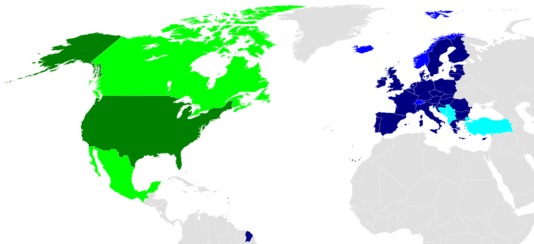- About
- Topics
- Picks
- Audio
- Story
- In-Depth
- Opinion
- News
- Donate
-
Signup for our newsletterOur Editors' Best Picks.Send
Read, Debate: Engage.
| August 20, 2014 | |
|---|---|
| located: | USA, United Kingdom, France, Germany |
| by: | Gurmeet Singh |
The proposed arrangement seeks to make trade between the European Union and the United States of America easier by lifting current restrictions and thereby liberalising goods and services between these trading zones. In other words, it seeks to create free trade between these markets.
On the face of it, it seems like a pretty robust deal- boost trading between the two regions, and create, as its supporters say, multi-lateral economic growth, as well as jobs. They also point to the direct benefits the average European and American families will feel.
Critics of the arrangement point to the purported effects the arrangement will have on existing agreements, and the enhanced power of corporations at the expense of states. For example, there are fears that the proposed treaty may nullify existing ones and thereby enable damaging goods, such as unclean meat, to once again enter our markets.
But these objections seem commonplace enough- possibly resolvable through due process. So why are protestors being arrested outside of Brussels and Washington D. C. whenever a round of talks is held? Why has the European Commission received over 150, 000 responses to its public consultation about the treaty? Why are civil society organisations and NGOs in Europe rallying against the TTIP? After all, international trade agreements don’t pull crowds.
The clue, as it so often is, is in the name: partnership. Critics and protestors more often refer to the TTIP by its original name- TAFTA, or the Trans-Atlantic Free Trade Agreement. At least with this name they say, the arrangement does not make any pretence towards partnership and consent between nations. Indeed, consideration of who the partners exactly are sheds light on their concerns: states and corporations have their seat at the table, of course- but what about citizens?
The proposed agreement will be a giant step towards enshrining the rights of corporations over citizens. Indeed, the during the formulation of the TTIP or TAFTA, all ‘stakeholders’ in the talks have acted as though citizens had neither rights nor say; if Die Zeit had never broken the story to the public, it may never have come to light that representatives of the European Union and the USA, and corporate lobbies were holding talks about the agreement. Citizen representatives, in the form of Civil Society groups, NGOs and think-tanks were excluded from these talks- and despite claims by the European Commission that the process was fair and open to the public, by December 2013, the Commission had met 119 times with corporations and lobbyists and only 8 with civil society groups.
As if conducting a monumental trade agreement behind closed doors wasn’t shady enough, the proposed agreement includes details on Investor State Dispute Settlements (ISDS). That is, it provides legal recourse for corporations to sue governments, bypassing domestic courts and national, sovereign structures. It has been included in other major agreements, and is currently being used, in one infamous example, of the tobacco company Philip Morris’ lawsuit against the Australian government, for bringing in brand free packaging for all cigarettes.
There are many implications to the TTIP, but I wish to highlight two:
The proposed treaty, in its formulation, and the agreement it seeks to obtain will all but eradicate citizen power in the face of corporations in the EU and USA. If citizens elect politicians to tackle climate change, oil companies will have real power (not just influence) over those politicians. If citizens bring cases against corporations through their sovereign courts, they could potentially be bypassed by those corporations.
Bypassing courts, or having appeals transferred up from a domestic court to a European one is a rare occurrence, but can empower citizens to overrule national law in EU member states; in the past, citizens have used this mechanism of appeal to counter the power of corporations. By allowing corporations to bypass national courts, the TTIP will make grant them a degree of unaccountability.
Finally, there is the problem of justification. EU Commissioners have often pointed to a lack of coherence on the part of citizens as consumers. We want socially-minded and accountable enterprises, but we also want cheap goods. A quick glance into supermarket shows the supremacy of the cheap good over the more expensive, but more ethical good. The TTIP will bring in these goods into the US and EU markets; we must ask ourselves, is that the benefit we want? Are we willing to enhance investor and corporate rights for the sake of slightly less expensive goods? Do we want increase the burden on our environment by the inevitable increase in shipping between markets, for the sake of these goods?
Not only consumers will lose out if we choose to answer ‘yes’. Producers, small-scale enterprises, especially farmers and other primary sector producers will lose out. The market will be flooded with cheaper goods; making the locally produced good lose out in its own market. Livelihoods will be ruined, and big-business will once again succeed.
This isn’t left-wing drivel; make no mistake about it, it will be citizens who lose out if the TTIP or TAFTA is implemented, and corporations who gain.
There are things we as citizens can do however:
Clarify our aims: do we want cheap goods, or a stable citizenship?
Get on board: find an anti-TTIP petition in your region and sign it.
By copying the embed code below, you agree to adhere to our republishing guidelines.

